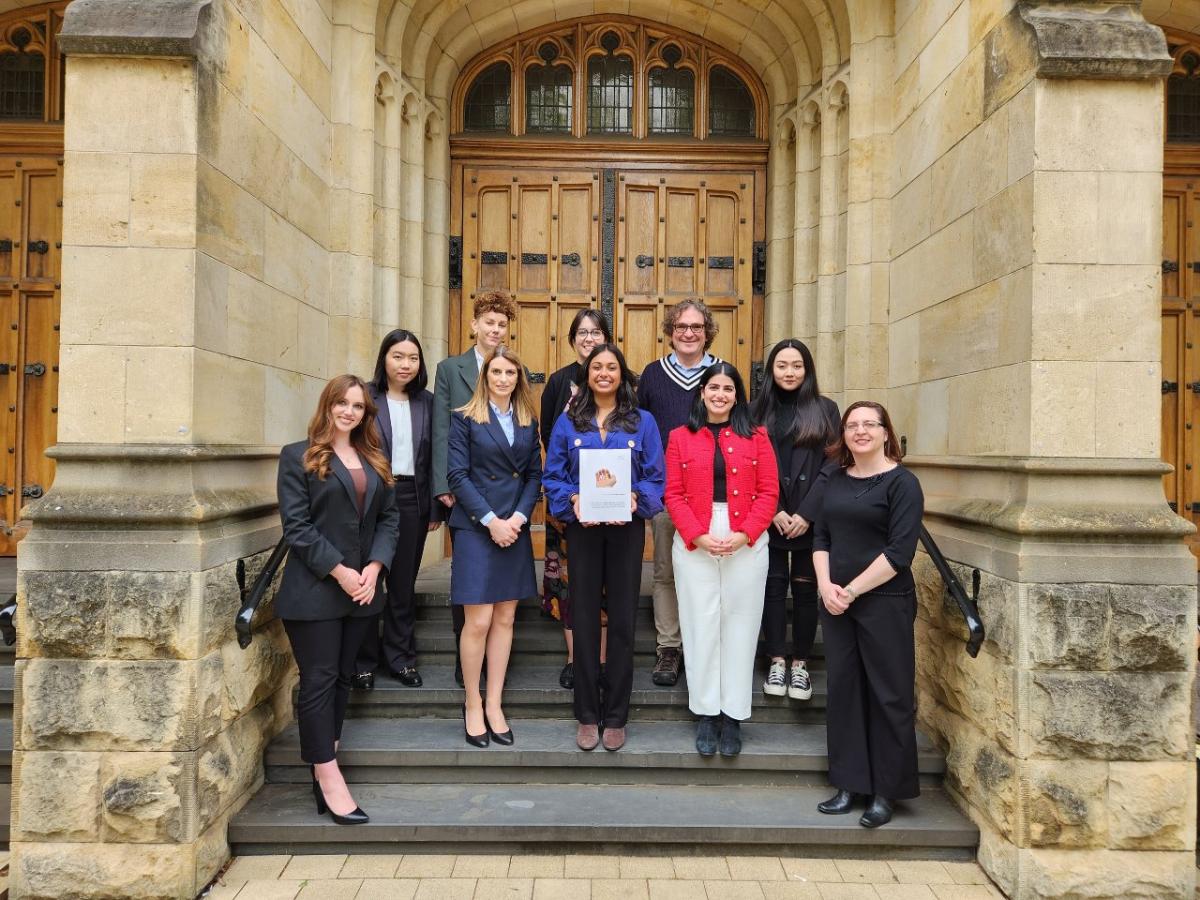
The team behind SALRI's report in to safeguarding vulnerable adults.
The independent South Australian Law Reform Institute (SALRI) based at the University of Adelaide is recommending important changes to South Australia's laws regarding how vulnerable adults are safeguarded.
SALRI was asked by the South Australian Government to conduct an independent review of the operation of the current Ageing and Adult Safeguarding Act 1995 (the Act) for the Minister of Health and Wellbeing.
Director of SALRI, the University of Adelaide's Professor John Williams said SALRI assessed the future of adult safeguarding in South Australia and considered the wider impacts of legislative changes in the adult safeguarding service landscape. Today, Tuesday 1 November, SALRI is making its report publicly available.
"SALRI considered current law and practice through its wide-ranging consultation with a diverse range of stakeholders and community members and has made 46 recommendations to improve the operation of the Act as well as the bodies implementing the Act," said Professor Williams.
"SALRI's report seeks to balance the autonomy of the adult who might be vulnerable to abuse with the need to safeguard such individuals from abuse and exploitation. Our recommendations reflect the Act's strong focus on upholding human rights by respecting the autonomy, dignity, and presumption of decision-making capacity of an adult."
SALRI's recommendations include to:
- Retain the Adult Safeguarding Unit's (ASU) remit to cover all adults vulnerable to abuse.
- Define the term abuse according to a relationship or situation of trust, power or dependency between the apparent victim and perpetrator.
- Introduce a clear definition in the Act of 'safeguarding' that protects an adult's health, wellbeing and human rights, and enables them to live free from abuse.
- Include within the South Australian Charter of the Rights and Freedoms of Vulnerable Adults the entitlement of both older persons and persons with disability to live and make decisions without coercion, undue influence or psychological abuse.
- Grant the ASU the flexibility to take appropriate 'safeguarding actions' to meet the safeguarding aims of the Act and the unique needs of each adult.
- Include guidelines and toolkits to use when determining whether an adult at the subject of a report has the capacity to make decisions.
- Explicitly defining consent as a free and voluntary decision free of coercion or undue influence.
The SA Government's Office for Ageing Well (OFAW) was set up under the Act. The Act also establishes the ASU as an agency safeguarding the rights of adults, which was notably the first of its kind in Australia. The scope of SALRI's review was limited to the operation of the Act and did not consider administrative processes, funding, or resourcing matters.
Lead SALRI researcher and report co-author Divya Narayan highlighted the valuable work and vital roles of both the OFAW and the ASU.
"SALRI suggests that the OFAW and ASU should be retained but with changes to clarify and strengthen their respective roles and functions," she said.
"In relation to the ASU, SALRI 's recommendations seek to increase the flexibility of the Act to allow ASU practitioners to exercise their clinical judgment and take action on a case-by-case basis according to best practice.
"In other areas, where appropriate, SALRI has recommended greater clarity and specificity to ensure that the ASU and the OFAW have clear mandates. For the ASU, this ensures that their role in safeguarding potentially vulnerable adults is clear despite the changing service landscape."
"SALRI's report seeks to balance the autonomy of the adult who might be vulnerable to abuse with the need to safeguard such individuals from abuse and exploitation. Our recommendations reflect the Act's strong focus on upholding human rights by respecting the autonomy, dignity, and presumption of decision-making capacity of an adult."Director of SALRI, the University of Adelaide's Professor John Williams
SALRI's review highlighted the importance of defining and addressing coercion, gaslighting, consent and capacity.
The University of Adelaide's Associate Professor David Plater, Deputy Director, SALRI who was the lead author of the report said: "SALRI uncovered from its consultation and research that gaslighting and psychological abuse, often linked to financial abuse, are insidious forms of abuse older people and people with a disability, who are often overlooked.
"We found that the presence of psychological abuse, gaslighting or coercive control it is an important factor that must be considered in looking at a victim's capacity or consent for the ASU to take action in response to reports of suspected abuse.
"In some circumstances, such as the risk of serious physical or financial abuse or where a victim truly lacks capacity, the ASU should be entitled to take action without the victim's consent."
SALRI's review received input from agencies and organisations, community members and the media. SALRI received 60 submissions and 182 responses to its consultation survey, which informed SALRI's understanding about the operation of the AAS Act and options for potential changes to present law and practice.
SALRI's consultation included interested parties and agencies, community members, academics, legal and health practitioners, the disability community, aged care groups, multicultural communities and groups representing older people. SALRI also made regional visits to Port Pirie, Port Augusta, Clare, Port Lincoln, Berri, Whyalla, Naracoorte, and Mount Gambier to conduct community consultations. SALRI has a focus on active and inclusive engagement with regional and Aboriginal communities.
Following today's release of SALRI's report by the Minister for Health and Wellbeing, it will be for the South Australian Government and Parliament to consider SALRI's recommendations.






